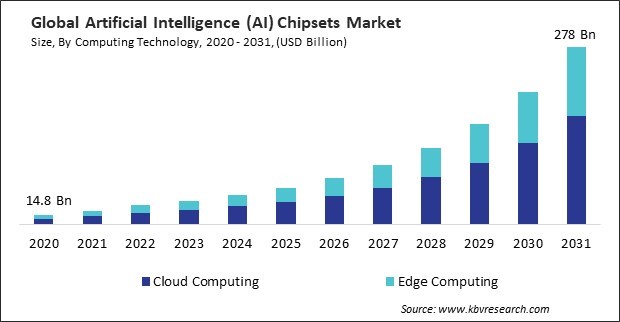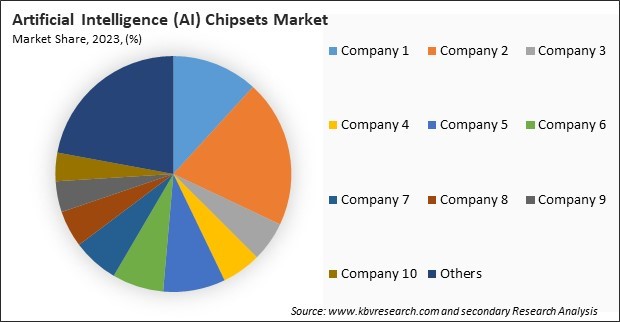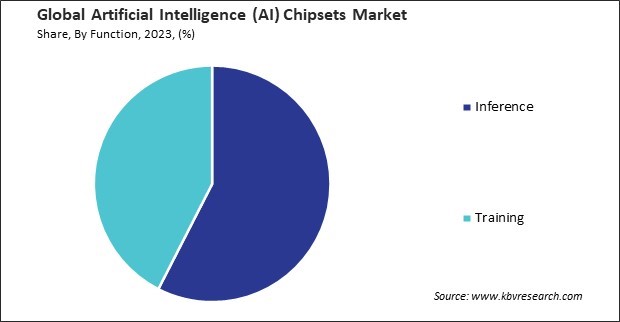“Global Artificial Intelligence (AI) Chipsets Market to reach a market value of USD 278 Billion by 2031 growing at a CAGR of 29.4%”
The Global Artificial Intelligence (AI) Chipsets Market size is expected to reach $278 billion by 2031, rising at a market growth of 29.4% CAGR during the forecast period.
Retailers and e-commerce platforms leverage AI chipsets to provide personalized shopping experiences to customers. AI-driven recommendation engines analyze customer data, purchase history, and browsing behavior to offer tailored product recommendations, promotions, and offers. Consequently, the retail & e-commerce segment would acquire nearly 11% of the total market share by 2031. personalizing the shopping experience, retailers and e-commerce platforms can increase customer engagement, satisfaction, and conversion rates.

Cloud-based AI services, offered by major cloud service providers like Microsoft Azure, Amazon Web Services (AWS), and Google Cloud Platform, provide access to vast computational resources for training and deploying AI models. Cloud-based AI services support various AI workloads, including training, inference, natural language processing, computer vision, and speech recognition. Therefore, expansion of cloud-based AI services is driving the growth of the market. Additionally, Edge computing reduces latency and permits real-time decision-making by allowing data processing and analysis closer to the data source or endpoint device. Similarly, edge computing enables AI-driven applications to operate autonomously and independently of internet connectivity, ensuring continuity and resilience in offline or low-connectivity environments. Thus, the proliferation of edge computing is propelling the market's growth.
However, Developing AI chipsets requires substantial investment in research and development (R&D) activities. This includes designing and testing new chip architectures, algorithms, and hardware components tailored to AI workloads. Likewise, prototyping and testing AI chipsets involve multiple iterations of design refinement, simulation, and validation to ensure performance, reliability, and compatibility with AI algorithms and applications. Therefore, high development costs are hindering the growth of the market.

The leading players in the market are competing with diverse innovative offerings to remain competitive in the market. The above illustration shows the percentage of revenue shared by some of the leading companies in the market. The leading players of the market are adopting various strategies in order to cater demand coming from the different industries. The key developmental strategies in the market are Acquisitions, and Partnerships & Collaborations.
By computing technology, the market is bifurcated into cloud computing and edge computing. The edge computing segment acquired 37.2% revenue share in the market in 2023. Edge computing brings computing resources closer to the location where data is generated (i.e., at the edge of the network), minimizing latency. This is critical for AI applications that require real-time or near-real-time processing, such as autonomous vehicles, industrial automation, and augmented reality/virtual reality (AR/VR) experiences.
Based on function, the market is segmented into inference and training. In 2023, the training segment held 42.4% revenue share in the market. Deep learning algorithms, such as convolutional neural networks (CNNs) and recurrent neural networks (RNNs), are widely used in AI for tasks like image and speech recognition, natural language processing, and autonomous driving.

Based on chipset type, the market is divided into FPGA, ASIC, CPU, and GPU. The CPU segment attained 23.3% revenue share in the market in 2023. CPUs are widely used for general-purpose computing tasks in AI applications, including data preprocessing, feature extraction, and post-processing tasks. While specialized AI accelerators such as GPUs and TPUs excel in parallel processing and AI-specific workloads, CPUs offer versatility and compatibility with various software frameworks and programming languages, making them essential for running AI algorithms in diverse computing environments.
The table below summarizes the key points highlighting the comparison of patent trends in the field of AI chipsets for Alphabet Inc., Intel Corporation, NVIDIA, IBM.
| Company | Recent Patent Trends | Focus Areas |
|---|---|---|
| Alphabet Inc. | Investing heavily in AI chipset patents, particularly for Tensor Processing Units (TPUs). | Machine learning, natural language processing, and AI acceleration. |
| Intel Corporation | Focused on AI acceleration through CPUs and newly integrated AI features in data center products. | AI chipsets for data centers, machine learning, and inference applications. |
| NVIDIA | Leading in AI patent filings, especially for GPUs optimized for AI tasks. | Data center GPUs, autonomous systems, and edge AI applications. |
| IBM | Consistent innovation in AI hardware and AI software integration. | AI hardware, AI software, and hybrid cloud solutions. |
On the basis of vertical, the market is segmented into consumer electronics, BFSI, manufacturing, government, retail & e-commerce, healthcare, automotive, marketing, and others. The automotive segment acquired 17.6% revenue share in the market in 2023. The development of autonomous vehicles relies heavily on AI technologies to perceive the environment, make real-time decisions, and navigate safely. AI chipsets power the perception systems, sensor fusion algorithms, and decision-making modules in autonomous vehicles.
Free Valuable Insights: Global Artificial Intelligence (AI) Chipsets Market size to reach USD 278 Billion by 2031
Region-wise, the market is analyzed across North America, Europe, Asia Pacific, and LAMEA. The North America region witnessed 39.2% revenue share in the market in 2023. North America is a global center for technical innovation and entrepreneurship, especially in Silicon Valley, the United States. The region is home to many leading AI chip manufacturers, technology giants, startups, research institutions, and venture capital firms that drive innovation and investment in AI hardware technologies.
| Report Attribute | Details |
|---|---|
| Market size value in 2023 | USD 37 Billion |
| Market size forecast in 2031 | USD 278 Billion |
| Base Year | 2023 |
| Historical Period | 2020 to 2022 |
| Forecast Period | 2024 to 2031 |
| Revenue Growth Rate | CAGR of 29.4% from 2024 to 2031 |
| Number of Pages | 323 |
| Number of Tables | 490 |
| Report coverage | Market Trends, Revenue Estimation and Forecast, Segmentation Analysis, Regional and Country Breakdown, Market Share Analysis, Porter’s 5 Forces Analysis, Patent Analysis, Company Profiling, Companies Strategic Developments, SWOT Analysis, Winning Imperatives |
| Segments covered | Computing Technology, Function, Chipset Type, Vertical, Region |
| Country scope |
|
| Companies Included | Intel Corporation, NVIDIA Corporation, IBM Corporation, Micron Technology, Inc., Qualcomm Incorporated (Qualcomm Technologies, Inc.), Samsung Electronics Co., Ltd. (Samsung Group), Apple, Inc., Huawei Technologies Co., Ltd. (Huawei Investment & Holding Co., Ltd.), Texas Instruments, Inc. and NXP Semiconductors N.V. |
By Computing Technology
By Function
By Chipset Type
By Vertical
By Geography
This Market size is expected to reach $278 billion by 2031.
Expansion of cloud-based AI services are driving the Market in coming years, however, High development costs restraints the growth of the Market.
Intel Corporation, NVIDIA Corporation, IBM Corporation, Micron Technology, Inc., Qualcomm Incorporated (Qualcomm Technologies, Inc.), Samsung Electronics Co., Ltd. (Samsung Group), Apple, Inc., Huawei Technologies Co., Ltd. (Huawei Investment & Holding Co., Ltd.), Texas Instruments, Inc. and NXP Semiconductors N.V.
The expected CAGR of this Market is 29.4% from 2024 to 2031.
The Cloud Computing segment is generating the highest revenue in the Market by Computing Technology in 2023; thereby, achieving a market value of $170.6 billion by 2031.
The North America region dominated the Market by Region in 2023, and would continue to be a dominant market till 2031; thereby, achieving a market value of $103.8 billion by 2031.
Our team of dedicated experts can provide you with attractive expansion opportunities for your business.

 Drivers
Drivers
 Restraints
Restraints
 Opportunities
Opportunities
 Challenges
Challenges
